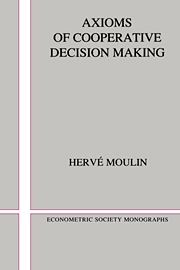6 - Equal versus proportional sharing
Published online by Cambridge University Press: 05 January 2013
Summary
Overview
In Part III we apply the tools forged in Parts I and II to specific microeconomic surplus-sharing problems. The two problems discussed in this chapter are the simplest models of surplus and cost sharing, in which the distributive issue has no obvious answer.
The cost-sharing problem is best thought of as the provision of an indivisible public good, say, a bridge or any such public facility. The issue is how to share the cost of the facility. The only available data are the total cost of building the bridge and the benefits that each agent derives from the facility (a single dollar figure per agent since we assume quasilinear utilities). Another interpretation of the same formal model is the settlement of a bankruptcy. Here the agents are creditors of the bankrupt firm; each agent holds a monetary claim over its estate, but the total value of the estate falls short of the sum of the claims. The problem is to share the estate among its creditors.
The surplus-sharing problem is that of dividing the proceeds of an indivisible cooperative venture among several partners. Think of an orchestra giving a single performance. The receipts must be shared among the musicians; the sharing rule must be based upon the estimated “market value” of each musician, again, a single number per agent representing his opportunity cost of joining the orchestra. Assuming that the receipts exceed the sum of the opportunity costs, how should it be divided among the agents?
Information
- Type
- Chapter
- Information
- Axioms of Cooperative Decision Making , pp. 145 - 165Publisher: Cambridge University PressPrint publication year: 1988
